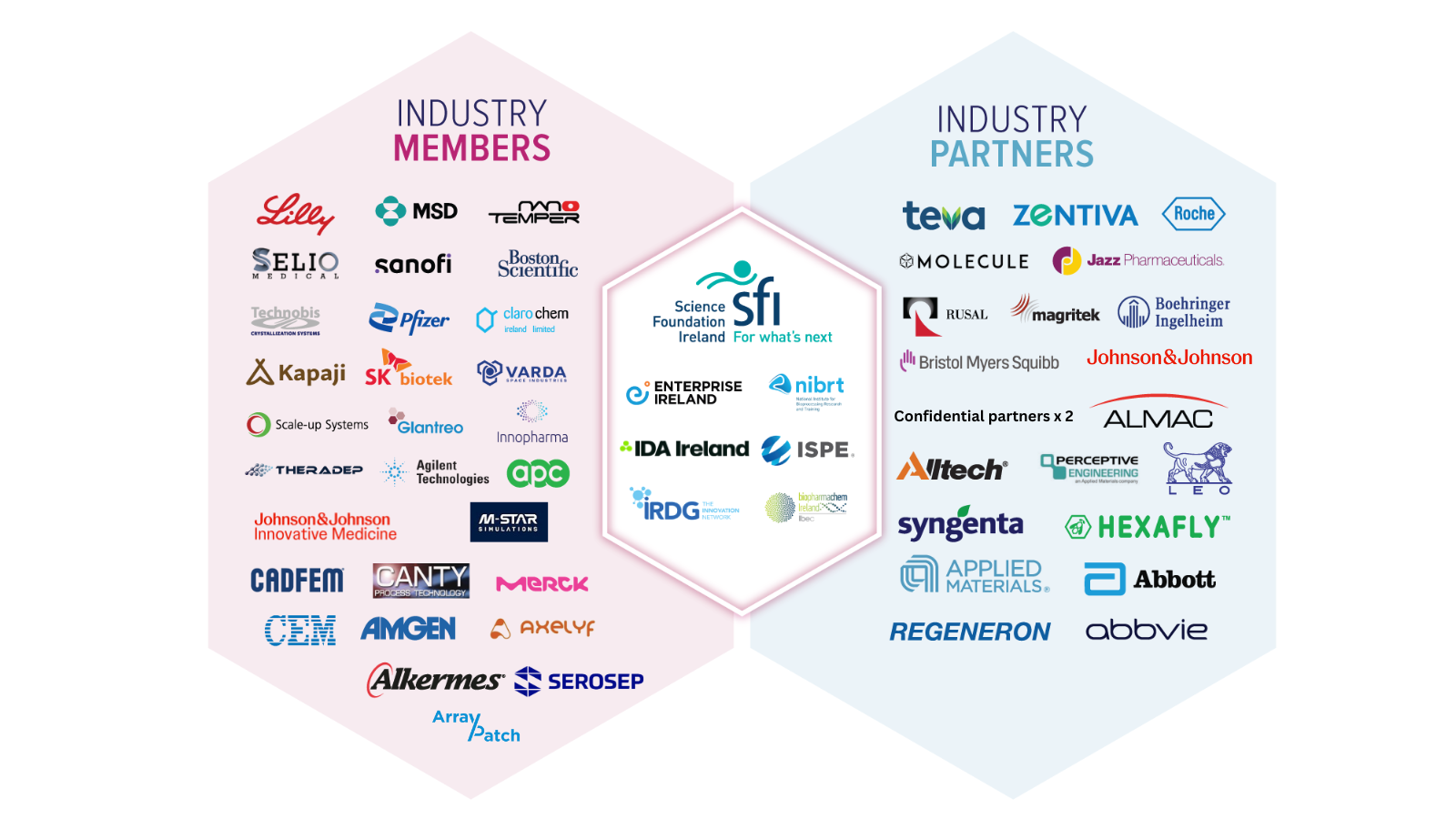Industry
SSPC provides the sector with a nationally distributed, research performing community that enables high impact, collaborative research between industry and academic partners within the life sciences sector. The Centre has a broad research capability that encompasses scientific expertise in small and large molecule drug substance and drug product manufacturing with a particular emphasis on process optimisation, data analytics and ATMPs
SSPC supporting industry partners:
Offering world-wide companies a unique and pioneering research proposition.

Industry Engagement
Since its inception, SSPC has successfully collaborated with over 51 industry partners, composed of indigenous and foreign operations, whose size range from small to multi-national.
“””Our success is defined through our unique collaboration, which builds R&D excellence in one of Ireland’s largest industry sectors. SSPC’s rich history has resulted in €22.4 million of supplementary investment from industry over the last ten years, delivering significant economic and human capital impacts.
While SSPC started its journey in the small molecule API space. The programme of work in the large molecule-biologics space has increased with 38% projects within this area and also medical devices.
Our industry partners benefit from the depth and breadth of expertise available within SSPC. Through collaboration, SSPC augments the R&D capabilities of companies, while increasing opportunity for technology transfer and commercialisation.
SSPC supports an industry membership model providing many benefits including access to training, ability to host a PhD student placement, gateway to a talent pipeline and the opportunity to network and collaborate with both the Centre’s academic and industry community. Each year many collaborative projects are inititated. These research projects bring together complementary interdisciplinary skills from across our partnering academic institutions.
Working with us
If you’d like to know more contact our Business Development Manager, [email protected]
Industry Engagement Manager, [email protected]
Research Programme Manager, Targeted Projects, [email protected]
“MSD have been involved with SSPC since its inception as a cluster … The company sees the benefit the SSPC offers in strengthening their Irish manufacturing operations as it positions itself to continue to move up the value chain and compete globally for R&D projects and retain the production of existing and new Drug Substance and Drug Products.”
Dr Tom O’Ceallaigh, Director of R&D Chemistry, MSD, Ballydine
“A key aspect for APC in advancing our technology development and research capability is working with the brightest and best minds. We are extremely proud that APC is the largest employer of graduates from SSPC. For us as an industry partner, our support into the Centre research focus, education development programs and talent development is simply essential to APC’s future and sustained growth.”
Dr Mark Barrett, CEO & Co-Founder APC Ltd.
“It was a pleasure for our team to work with the Van den Akker modelling group in SSPC with support from Aisling Arthur and the University of Limerick Technical Transfer Office. The work was conducted to the highest academic and professional standards and provides reassurance about scale-up from these very common lab set-ups. The approach of the modelling team made excellent use of state of the art facilities and automation opportunities as well as their knowledge of fluid mechanics and modelling techniques.
“The efficiencies gained through the process improvements will ensure that life-saving biologic drug products make it to patients and are not wasted due to traditional status quo methods and technologies.”
Looking to engage with us?
Become an Industry Member
- Access to a €12M research programme with world leading academic experts
- Initiate a research project aligned with your research priorities
- Access a talent pipeline comprising over 100 PhD graduates and post-doctorate researchers
- Co-supervise, inform and host PhD students in an area relevant to your organisation
- Upskill your workforce through our industry based PhD and Master’s programme
- Benefit from high caliber training sessions
- Be part of an international community of practice for pharmaceutical research, innovation and training
Develop a Research Project
Industry projects can be supported in a number of ways in SSPC.
- Companies have the option to initiate fully funded industry specific research projects and own all project IP thanks to a flexible Irish IP protocol that facilitates industry led project collaborations with Irish research performing organisations.
- Companies can also avail of SSPC Co-Funding (max. 50%), providing organisations with the opportunity to licence back any IP arising.
Working in partnership with the SSPC your organisation can:
- solve key industrial challenges;
- develop R&D capabilities;
- attract new talent
- co-author publications;
- upskill staff; and
- network with industry peers in a world leading international community of practice
















